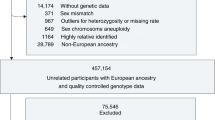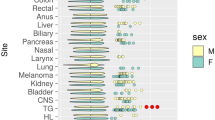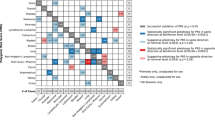Abstract
IN a review of the evidence relating to familial aggregations of malignant disease in man it was concluded1 that these can generally be attributed to genetic factors. A similar conclusion2 has since been drawn with respect to lung cancer in man. The commonest form of predisposing inheritance appears to be a simple Mendelian dominant of incomplete penetrance, although very occasionally (but especially with parental consanguinity) apparent recessive inheritance is observed in childhood leukæmia and lymphosarcoma1. Although for a specific cancer the inherited predisposition usually affects only a single autosomal locus (perhaps one of several), the phenotypic expression in adults should generally involve somatic mutation of the gene homologous with the inherited allele, together with somatic mutation of homologous genes at another locus1,3. From twins studies4, the typical penetrance of a predisposing allele in the phenotypic form of any malignancy is calculated to be about 0.3 (ref. 1), but for a life-span of 70 years it is likely to be slightly higher than this. Cancers arising in a genetic carrier are described as ‘prezygotic’; but where there is no specific predisposition, and where all mutational events are confined to somatic cells, the resulting cancer is described as ‘postzygotic’5. It was concluded that in the absence of powerful extrinsic carcinogens, most human malignancies are probably prezygotic1. Extrinsic carcinogens should tend to change the balance in favour of postzygotic malignancies.
This is a preview of subscription content, access via your institution
Access options
Subscribe to this journal
Receive 51 print issues and online access
$199.00 per year
only $3.90 per issue
Buy this article
- Purchase on Springer Link
- Instant access to full article PDF
Prices may be subject to local taxes which are calculated during checkout
Similar content being viewed by others
References
Burch, P. R. J., Nature, 197, 1042 (1963).
Tokuhata, G. K., Amer. J. Pub. Hlth., 54, 24 (1964).
Burch, P. R. J., Nature, 197, 1145 (1963).
Jarvik, L. F., and Falek, A., Cancer, 15, 1009 (1962).
Stewart, A., Brit. Med. J., i, 452 (1961).
Tokuhata, G. K., and Lilienfeld, A. M., J. Nat. Cancer Inst., 30, 289 (1963).
Tokuhata, G. K., and Lilienfeld, A. M., Pub. Health Rep. (Washington), 78, 277 (1963).
Burch, P. R. J., Nature, 195, 241 (1962).
Videbaek, A., Heredity in Human Leukœmia (Busck, Copenhagen, 1947).
Morganti, G., and Cresseri, A., Sang, 25, 421 (1954).
Author information
Authors and Affiliations
Rights and permissions
About this article
Cite this article
BURCH, P. Genetic Carrier Frequency for Lung Cancer. Nature 202, 711–712 (1964). https://doi.org/10.1038/202711a0
Issue Date:
DOI: https://doi.org/10.1038/202711a0
This article is cited by
-
Cancer-inducing niche: the force of chronic inflammation
British Journal of Cancer (2022)
-
Premorbid psychological factors as related to cancer incidence
Journal of Behavioral Medicine (1978)
Comments
By submitting a comment you agree to abide by our Terms and Community Guidelines. If you find something abusive or that does not comply with our terms or guidelines please flag it as inappropriate.



